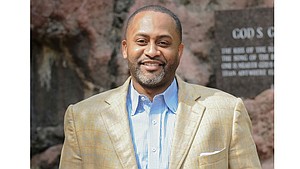By Rev. Earle J. Fisher, Special to The New Tri-State Defender

On Nov. 4, 2014, Allan Turner of the Houston Chronicle wrote an article examining the historical relationship between voting and churches. Turner argued that this relationship is “as old as America.” His opening statement was, “In the beginning, North America was God’s country.”
He’s wrong.
The earth is the Lord’s. True. But “God’s country” is the phrase white supremacists use as a divination to justify their colonial conquests.
However, Turner’s premise is similar to one I posited in my last article. The line of separation between church and state is political not practical.
In other words, our constitution sets forth, through the first amendment, a protection against any state-endorsed or federalized faith. We are a country rooted in the freedom of religious expression. This is the political take on religion in America. The practical take is that our faith – for better or worse – guides our personal practices. Since politicians are people, 98 percent of them identifying as religious, the practical reality of church and state is not black and white but many shades of gray.
Nevertheless, when it comes to this election cycle many people in the country are feeling blue – pun intended. We feel our choices are always limited to the lesser of two evils. Many of us, in spite of our proclaimed religious convictions, feel helpless and hopeless. I believe our despair is by design. But, I also believe that sentiment is deeply misleading.
In such a tense time with some much at stake, both politically and personally, we are reaping the whirlwind of distrust and insecurity due to our basic political, civic and societal ignorance. I’m not trying to be pejorative. I’m seeking to be practical.
Politically, our communities, culture, and country are suffering from (among many other things) a basic misunderstanding of civics. This misunderstanding misguides us to seek a mythical “perfect” instead of working towards a meaningful “progress.” (I understand that BOTH of these are relative terms.)
Simply put, we really don’t know how politics and society work on a practical level. This makes it more difficult for us to organize around principles and policies – notice I didn’t say candidates – that empower the masses. Instead, we swing like a pendulum, back-and-forth, between a naïve optimism and a pessimistic nihilism. We either suspect that everything will work out fine even if we don’t work for it. Or, we’re skeptical that nothing will work no matter how much effort and intelligence we apply.
Therefore, we are conditioned to demonize everyone who seeks to manage the middle ground in a way that is, at all, different from our individual and ideological convictions. This leaves us at a stalemate that maintains an unjust status quo.
We have to be more thoughtful and intentional with our practices and proclamations. Our lives, the human condition itself and our political existence is always wrought with complexities. We rarely, if ever, have the luxury of engaging in “all or nothing” arguments and exercises. We have to do better than that.
We have to constantly ask ourselves, “What is the next, best move we can make in a series of efforts to obtain our collective liberation in light of the options before us?” Human beings progress by steps not teleportation. We have to live even while we’re learning. We have to work even while we’re weeping.
Everybody has to be doing something to contribute to our collective well-being. We have to grow to a place where we affirm every meaningful measure of resistance to our oppression. Education. Politics (including voting). Faith. Family. Economics. All of it matters! Indecision and disengagement in any of these areas only results in continued despair.
We must remain involved even when it seems that our odds are insurmountable. We must continue to critique an unjust system even as we work within and outside of it to ensure our needs are met and our experiences are affirmed and represented in places of power.
We don’t win by simply taking our ball and going home. We don’t succeed by merely talking about what we’re against and what’s not working.
We win by working on and working towards those things we believe matter most.
Don’t be deceived. Every vote matters. Every election matters. This year’s ballot is important. And so is the ballot box we punch, click and write-in every day we decide to fight for our freedom.
(The Rev. Earle Fisher is senior pastor of Abyssinian Baptist Church and co-spokesperson for the Memphis Grassroots Organizations Coalition.)